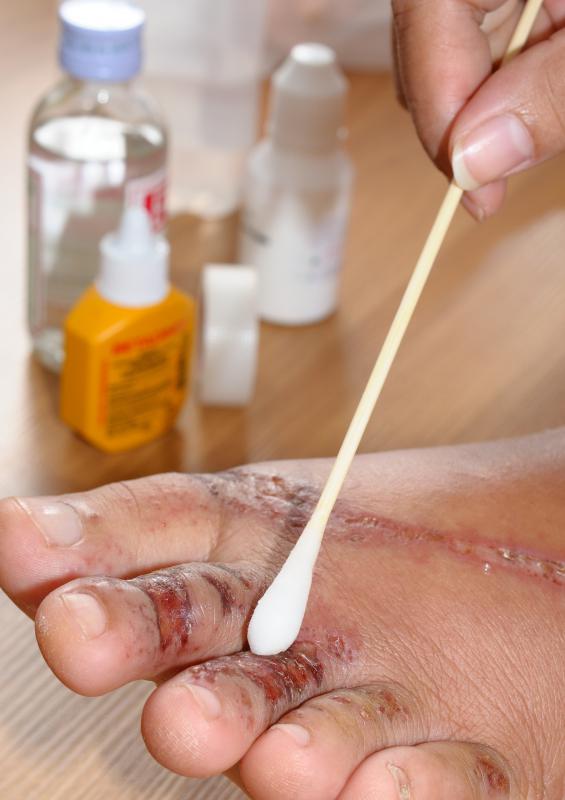At WiseGEEK, we're committed to delivering accurate, trustworthy information. Our expert-authored content is rigorously fact-checked and sourced from credible authorities. Discover how we uphold the highest standards in providing you with reliable knowledge.
What can I do About an Open Wound?
An open wound can mean many different things. It can be a scrape that has taken off a layer or two of skin but is not a deep cut. Alternately, wounds might come from the bites of animals or other people, they may cut through many layers of skin and be gaping, or they might arise from punctures in the skin. Early care of the open wound is important to accelerate healing and to minimize chance of infection or other complications.
When dealing with scrapes, which may also be called abrasions, most times people won’t need stitches and might not need medical care unless the abrasion is very large, is in addition to injury under the skin, such as potential bone fracture, or has matter in it like glass, wood or chemical irritants that cannot be thoroughly cleaned. As with most wounds, the first place to start is in rinsing the wound with water. Depending on where it’s located this could be done with a showerhead or a sink faucet or sprayer. Rinsing needs to occur for about ten minutes, and people might extend this time to fifteen minutes if debris remains in the wound.

The other thing that could be necessary with an abrasion is pressure on the wound to make it stop bleeding. Most abrasions don’t bleed heavily but they might if people have bleeding disorders that make clotting time poor, or if they take certain medications that have the same effect. If the abrasion can be rinsed clean and bleeding stops easily, applying some antibacterial cream and a bandage may be the only care required. Should greater injury be suspect like fracture or if the abrasion occurs on the head as a result of head injury, people should contact their doctors or proceed to an emergency room.

Animal and human bites can contain a variety of infectious elements including diseases like rabies or high levels of bacteria. Cleaning the wound and using pressure to stop bleeding is generally not enough. Most times doctors recommend that this form of wound be treated immediately at either a doctor’s office or hospital.
Lacerations may or may not be treated at home. The gold standard for determining when people should get hospital or medical care for this type of wound is dictated by the length of the wound. Anything .5 inches (1.27 cm) or longer might need stitches. A shorter wound could need them too, especially if it continues to bleed after ten minutes of applying pressure, or if blood appears to ooze or spurt from the open wound, especially with the heartbeat. This may suggest greater injury.

Puncture wounds may also require hospital care, particularly if the puncture appears very deep. These may not bleed as much because injury is much farther into the skin, but many puncture wounds are with things made of metal that might have some rust on them. This can pose risk for tetanus, and people who have not had a tetanus booster shot in the last few years, might need to get another one.

One of the reasons that doctor care is required to treat an open wound in many cases is because risk of infection tends to multiply as the hours pass. A wait and see approach to a wound that might need stitches is ill advised. Doctors may then not be able to give stitches until a patient has taken a course of antibiotics to prevent an infection, and that could leave people with an unhealed wound for much longer.

Care of the wound after it receives appropriate treatment could vary depending on what that treatment is. For small lacerations or abrasions, using a little antibiotic cream and changing bandages each day is usually enough to prevent infection. It’s normally fine to shower, and simply change bandages afterwards.
Stitched wounds could have different directions depending on severity. In all cases, doctors will want people to look for signs of developing infection, and these include redness or warmth at the site. An infected wound may also exude pus or have red streaks that emanate from it. Presence of fever could suggest infection too and should be considered as a reason to alert the doctor. A wound that reopens should also receive medical attention.

Most people will recover from open wounds without complications. They just take a little caution and care. Standard rules on wound treatment are to get medical help if in doubt, if a cut seems too large, if debris can’t be cleaned from it, if other more serious injury might be below the wound, or if bleeding cannot be stopped with ten minutes of pressure.
AS FEATURED ON:
AS FEATURED ON:
















Discuss this Article
Post your comments